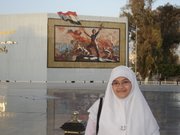
Di hari jumat, pagi-pagi sekali aku dan suami pergi ke tempat mama Mesir. Kami berdua sengaja tidak sarapan di rumah karena, kami janji akan berada di rumah tuan rumah kami itu paling lambat pukul sembilan pagi.
Akhirnya kami sarapan di restoran to'meya dekat rumah mama di daerah sekitar mu'tamarot, tempat dimana pameran buku internasional biasa digelas setiap tahunnya. Selesai makan kami cepat-cepat ke rumah mama karena si Noha sudah dari tadi miss call hp kami.
Sampai di sana, ala mak.... mereka belum pada siap-siap! Kami kira, begitu kami datang langsung cabut ke Syubro, tempat Tita tinggal, tapi ternyata mereka baru pada bangun, cuma mama yang kelihatannya sudah bangun dari tadi. Karena aku lihat rumah sudah rapi. Mama bilang hari ini dia bangun pagi-pagi sekali langsung mencuci baju, membersihkan rumah dan dapur dan tugas rumah lainnya. Sedangkan anak-anaknya asyik tidur.
Hampir satu jam kami menunggu mereka siap-siap, Baba baru bangun, Noha juga. Huh payah deh.
Akhirnya berangkat juga kami ke Syubro. Ini pertama kalinya aku pergi ke sana. Dilihat dari gaya arsitektur bangunannya, Syubro memang bisa disebut kota lama, orang-orang Mesir bilang "Misr qodim". Kata baba uang sewa di daerah Syubro hanya 5 Le perbulannya. Aku pertama sih kaget, kok ada rumah yang sewanya hanya lima pound Mesir setiap bulannya, tapi setelah kulihat rumahnya yang memang sudah sangat tua ya..maklum lah. Di dalamnya nggak ada apa-apa, udah" butut". (hehehe)
Tapi lumayan loh buat mahasiswa. Tapi daerah Syubro nggak terkenal buat para pelajar asing. Distrik 10 tempat ku tinggal di sanalah kompleks pelajar asing tinggal. Dari berbagai negara khususnya orang-orang Asia.
Pertama kali masuk rumah Tita, istri Amu Sodik menyambut kami dengan ramah. Setelah itu Tita menyapa kami dengan senyumnya yang manis. Tita sudah berumur tapi kharisma kecantikannya masih tampak. Badannya masih sehat, segar. Tapi memang terkadang orang tua, nggak jauh dari pikun. Kami selalu ditanya "Gimana Mesir menurut kalian, Hilwa?" hampir 30 kali Tita bertanya dengan kalimat yang sama. Aku dan mas hanya tersenyum dan menjawab hal yang sama yang sudah kami ulang sekitar tiga puluhan juga.
Baba selalu pergi ke tempat Tita setiap hari Jumat, dan Jumat ini kami diajak mengunjungi ibunda baba yang tersayang ini. Tita sangat senang kami berkunjung ke rumah, beliau bercerita kebanggaannya pada Baba Mohammad.
Aku juga ngefens berat sama baba. Orangnya memang baik, nggak banyak ngomong. Kalau aku ada masalah pasti baba datang.
Selain Tita, di rumah itu keluarga Amu Sodik juga tinggal. Amu Sodik punya tiga anak, dua laki-laki, Muhammad dan Mustofa, satu Perempuan Syaima namanya. Dia pintar berbahasa Inggris dan Perancis, kami sempat cakap dengan bahasa Perancis dan Inggris. Keluarga itu bahagia sekali dan menyuruh kami untuk main ke sana lagi.
Beberapa jam setelah sholat jumat, kami pun pamit pulang. Tita senang sekali. Kami pulang ke rumah baba, di sana mama masak ikan bakar. Hmm enak deh akhirnya kami makan bersama dan satu jam kemudian kami pamit pulang.
Jumat yang menyenangkan.
Tapi...OOps aku punya banyak tugas kuliyah yang belum selesai.
Wah ngelembur nih....



